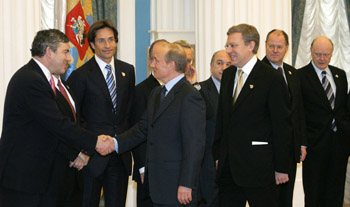|
Energy is central focus at G-8 finance meeting in Russia
(AP)
Updated: 2006-02-12 14:43
Russia's energy clout took center stage as Moscow hosted finance ministers
from the Group of Eight nations, its economy buoyed by high oil prices and its
reputation battered by a gas dispute with Ukraine.
Despite storm clouds from the gas fight that had threatened to overshadow
Saturday's discussions among the world's most industrialized nations, officials
appeared to put in place a blueprint for a summit of the G-8 heads of states in
July that will likely focus on energy security.

Russian President
Vladimir Putin (3rd L) shakes hands with Britain's Chancellor of the
Exchequer Gordon Brown (L), watched by Finance Minister Alexei Kudrin
(3R), as he welcomes G8 finance ministers and international financial
officials in Moscow's Kremlin February 11, 2006. G8 finance ministers are
committed to a speedy conclusion of talks to allow Russia to join the
World Trade Organisation (WTO) and only a few issues remain to be ironed
out, U.S. Treasury Secretary John Snow said on Saturday.
[Reuters] |
In their final communique, ministers warned of the effect of "high and
volatile" energy prices on the world economy, though they said global growth was
expected to grow in 2006. They also warned of the potential economic effects of
a global bird flu pandemic and called for more financial help for affected
countries.
"We are all concerned about the risks of rising energy prices and
what they do to growth," U.S. Treasury Secretary John Snow said at a news
conference after the meetings.
Russia _ which has seen its coffers swell from record-high oil prices and
provides about a quarter of Europe's gas _ made much of its position as the
world's second-biggest oil exporter after Saudi Arabia, touting new pipeline
projects with international investment.
"Decentralization of production and supplies to global markets will help ...
lower prices in the mid to long term," Russian Finance Minister Alexei Kudrin
told reporters.
Russia is currently building a gas pipeline directly to Germany under the
Baltic Sea, while a crude pipeline to Asian markets is awaiting approval from
regulators. Untapped reserves in the Barents Sea and Eastern Siberia offer rich
sources of new supply.
Kudrin also said that the government was working toward giving independent
gas producers equal access to the state controlled pipeline network.
|